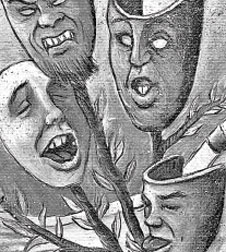Personality traits stand out
 Personality is the characteristics and qualities of a person seen as
a whole. Some people have an artistic personality. Your boss may have an
assertive personality. Then there are people with a likeable
personality. Sometimes we say, Mr X has a strong personality. There are
personality traits and some people wear clothes that express their
personality. When there is an excessive admiration of a famous person,
such as a politician, a personality cult is formed. Personality is the characteristics and qualities of a person seen as
a whole. Some people have an artistic personality. Your boss may have an
assertive personality. Then there are people with a likeable
personality. Sometimes we say, Mr X has a strong personality. There are
personality traits and some people wear clothes that express their
personality. When there is an excessive admiration of a famous person,
such as a politician, a personality cult is formed.
Sigmund Freud, perhaps the most controversial psychoanalyst,
formulated a comprehensive theory of human personality. Psychologists
say that the depths of his analysis and range of ideas are yet to be
rivalled. Apart from the dictionary definition, personality is the
organised psychological and physical components of a person that create
and determine his unique characteristics and behaviour. Although
personality is closely connected with physical appearance, it has a
mental element as well. For instance, when someone abuses us, we feel
hurt. And it can affect our personality.
 |
|
The same person may display
different personalities at different times |
The physical component of personality is adversely affected when we
meet with an accident leading to brain damage. Such an occurrence can
change our personality to a great extent. In other words, when the brain
is damaged, our personality undergoes a sea change. Even a person who is
paralysed can lose his personality.
Brain
It is our personality that determines what we do or what we say. What
goes on in our brain shapes our conduct. On the other hand, it is our
personality that makes us unique human beings. Even identical twins will
not have the same personality. On a lesser scale, you may come across
many people having the same name. However, all of them will have
different personalities. Moreover, your personality does not change when
you are dressed up for a function. With all your fine clothes, your
personality traits will be visible.
Although personality is mostly connected to your physical appearance,
memory too plays a significant role. If you lose your memory due to some
disease, your personality will be adversely affected. In psychology,
memory is divided into three parts: the conscious, preconscious and the
unconscious. At the conscious level we are aware of what we do. However,
our conscious awareness can be dominated or altered by what we hear, see
or feel. The preconscious, on the other hand, is made up of ordinary
memories. It helps us to remember birthdays, anniversaries and how to
use a computer. A child who learns how to ride a bicycle will be able to
do so even at the age of 60, provided his preconscious is not affected
by brain damage or disease.
Memory
The unconscious appears to be the most important part of the memory
because it stores all human experiences during a person’s lifetime.
Sometimes, you may not be able to recall an incident that is deeply
embedded in the unconscious. As a result, sometimes we find it difficult
to answer some simple questions because we have no access to the
relevant memory. As the mind is full of millions of thoughts it is not
easy to sort them out quickly.
Your memory has an impact on your personality. For instance, if you
are unable to recall certain facts and figures in the course of a
lecture, others will have a poor opinion of your personality. Although
forgetfulness is common in old age, if you keep your mind alert all the
time much damage can be avoided. More than the conscious and
preconscious, unconscious memories help us to build a unique
personality.
Although people’s personalities cannot be put into water-tight
compartments, psychologists have given us 16 personality types. You may
have seen people who are very duty conscious. They are known as “Duty
fulfillers.” Those who are quiet and reserved are “Mechanics” who are
good at mechanical work. “The Nurturer,” on the other hand, is a
conscientious person who thinks of others with a view to helping them.
He avoids conflicts as far as possible.
Value system
“The protector” has a well-developed value system but remains
individualistic all the time. “The Idealist” is a person of
philosophical bent. He is interested in serving his fellow-men. Another
type known as “the Scientist” has an analytical mind. Such people
usually become leaders. “The Thinker” has a logical mind. Theories and
ideas excite him. “The Doer” wants immediate results. Generally, he is
not a risk-taker. “The Guardian” entertains traditional views. He values
security more than everything else.
“The Performer” is a people-oriented person who lives for the moment.
“The Caregiver,” on the other hand, is a warm-hearted person with many
skills. “The Giver” is a popular person who is worried about what others
think and feel. “The Visionary” is an intellectual who is good at a
broad range of subjects. Finally, “the Executive” is an assertive and
outspoken person who is born to lead.
Most of us are composites of many of the above qualities. As a
result, we have different types of personalities. |

